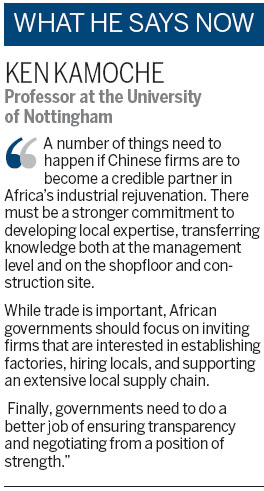The road ahead and all that jazz

An academic looking at Chinese-African business connections says he can hear music playing
This story was originally published on Nov 8, 2013
The wisdom of teaching someone to fish so they can feed themselves for a lifetime rather than giving them a fish so they can eat for a day is a tenet of many international aid organizations.
But in the many African countries that are landlocked, fishing rods count for little in the fight to survive, and it is advanced tools in the field of engineering that Chinese professionals are working with Africans as they seek to build globally competitive cities.
Skilled personnel are streaming into Africa following the flow of Chinese investment, and Ken Kamoche, a researcher and academic, says opportunities are being thrown up for Africans throughout the continent to pick up Chinese engineering expertise.
The transfer of knowledge from Chinese experts to Africans is essential if China's presence in the continent is to be deemed a long-term success, he says.
"Otherwise we will wind up with a fantastic infrastructure but we're not going to have people in jobs that are going to create enough work for them to use those roads."
The Kenyan-born Kamoche, a professor of human resource management and organizational studies at the University of Nottingham and author of Managing Human Resources in Africa, has spent several years examining hiring practices of Chinese companies setting up operations in Africa.
One of the biggest misconceptions, Kamoche says, is that Chinese companies are flying in employees en masse rather than employing locals.
"There are criticisms that the Chinese companies are bringing a lot of workers to Africa. That's not always borne out in reality."
The cost of airline tickets, providing food and housing often make bringing a large contingent of employees to Africa too costly, his research in Kenya suggests.
Instead, Chinese companies are bringing in high-level engineers and construction managers, and using locals for the less-skilled work.
"If you go out to the construction sites you will see Kenyan workers and the lone Chinese engineer or manager," he says.
"Where they are satisfied that they can find the expertise, they are hiring locally. My concern is whether they are actually transferring the knowledge, expertise and the technology."
The practice of reserving senior level positions for overseas employees, something most Western companies did when they first came to Africa many decades ago, can be detrimental, Kamoche says.

Comparable hiring practices were also the order of the day in China 20 or more years ago when multinational companies began to set up operations there.
"People do not often acknowledge that local managers have local knowledge," Kamoche says. "If you want to negotiate with politicians, with town council officials, or with business and employment bureaucrats, you need locals there.
"You are not going to rely on a Chinese manager who may not even be fluent in English to negotiate a reduced tax rate."
But compared with their Western predecessors, Chinese managers often seem to do a much better job of integrating with communities, Kamoche says.
China's focus on family, respect for the elders and creating close-knit workplace, traits which many African societies share, allows Chinese managers to form a closer bond with local employees, he says.
"Many (Chinese managers) are quite happy to get on a local bus to a building site or an area of the country where they're going to explore opportunities for business," Kamoche says, citing an example from his research.
"A Western expatriate would be flown in via helicopter because he doesn't want to be bothered with all the hassle on the ground."
It is shared values with African workers that could help China outshine Western countries in forming long-lasting partnership with Africans, he says.
At the very least, Kamoche says, it gives African countries bargaining power when forging relations with international companies.
"Africa is in a position where it can say to the West now, 'Look, we have an alternative.' And that alternative is the China-Africa engagement, and it's working for us because they're not giving us any hassle."
Whether dealing with the West or China, Africans must first feel assured with politicians at home, he says.
Kamoche, who is now engaged in research on Chinese investment in Africa on behalf of the British charitable trust the Nuffield Foundation, says much of the skepticism among Africans regarding the Chinese presence is the result of a perceived lack of transparency by those negotiating with foreigners on their behalf.
"I think the evidence suggests that there are question marks about the way public officials and politicians negotiate on behalf of the country," Kamoche says. "People don't have faith in them.
"They're not saying they're being ripped off by China. They're just saying, 'We don't fully trust our politicians and these officials who are signing contracts for us.'"
Making more details available on contracts signed between Chinese companies and African governments could go a long way in quelling this skepticism, he says.
"Politicians in Kenya, and up and down the continent, are beginning to accept that they need to start working for the people.
"They need to work on the image they are portraying and have more transparency because civil society has become a lot more demanding."
In his most recent book, Black Ghosts, a work of fiction, Kamoche explores the cultural contrasts between China and Africa through the eyes of a young Zimbabwean scholar trying to reunite with his Chinese wife in China.
The book reflects Kamoche's experiences working as a professor and newspaper columnist in Hong Kong and traveling throughout the Chinese mainland, as well as his research speaking with people who lived in Nanjing, Jiangsu province, during the 1980s.
"While there, I spoke to Africans who had studied and lived in China and kept hearing all of these fascinating stories of what life was like there."
Perceiving a lack of novels about the Africa-China story, Kamoche was instantly gripped.
"I had not read any fiction that looked at the concept of Africans living in China. Hopefully, this will introduce a piece of history in China that has not yet been explored, especially to the young generation."
Among his non-fictional works, Organizational Improvisation focuses on how the concepts of improv jazz can be applied while reacting to the day-to-day challenges in business.
Kamoche, a jazz aficionado, expands the metaphor to Chinese-African business interactions.
"You always wonder how jazz musicians can put on a performance which, unlike orchestral music, is not read from a sheet. The musicians are making it up as they go along, constantly communicating on stage who's going to lead, who's going to solo.
"Like in China and Africa, you're bringing together highly talented individuals who are given the autonomy to make the decisions and get the job done - at the same time having to follow certain guidelines."
























